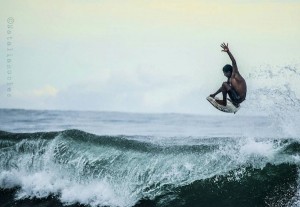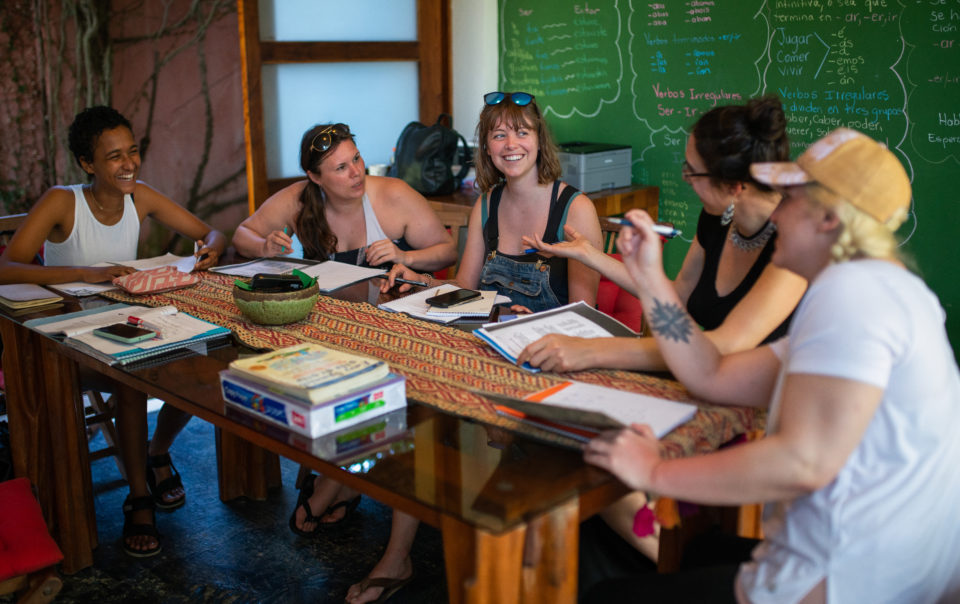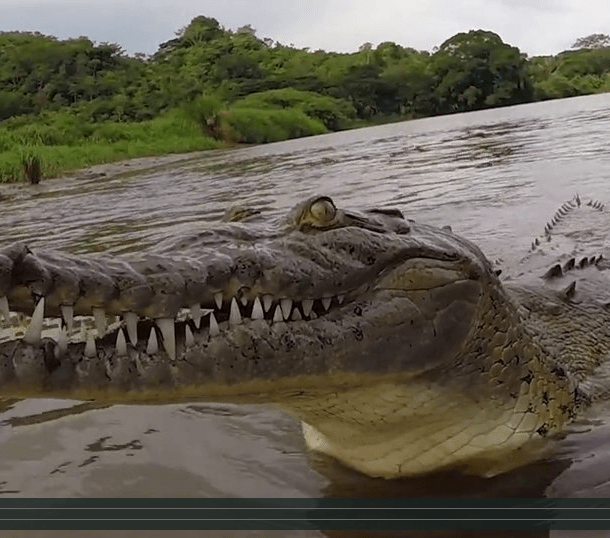
How to Find the Best Surf Camps in the World
photos courtesy of School of the World in Costa Rica
There are a lot of surf camps and surf schools to choose from around the world, so a lot of people are left wondering how to choose the best surf camp for them. In countries where surf tourism is a major industry (like here in Costa Rica) the choices can be overwhelming. The backdrops, conditions, options, and waves vary greatly from place to place, but there are a few important things that you can look for that will determine the value and quality of the destinations you are considering so you can make sure and find the best surf camp for you. No matter where you choose to learn, here are a few tips that should help with your travel planning:
What is the difference? These terms are sometimes used interchangeably and can even mean different things to different people. Surf schools are most commonly associated with beginner focused programs, and many of these are day camps or hourly lessons based out of a tent or stand on the beach. Surf Camps are usually programs or destinations that offer more complete packages that include lodging, surf sessions (lessons or guided surf sessions), sometimes equipment, and sometimes food, for multiple day experiences. Because people often associate surf schools with beginners and surf camps with intermediate/ more experienced surfers, surf businesses will use both terms to describe the same destination. For the purposes of this blog I’m talking about destinations that offer multi-day surf experiences because the beach-based hourly or daily lesson surf schools are too numerous and difficult to vet.
2. Is this a reputable business with a good history? Do they operate year-round or is it seasonal?
It is important with any business to see what their experience level, reputation, and history is, but especially important when you are talking about banking your precious vacation time and money. Some businesses are seasonal or only operate if they get enough clients to fill the spaces. Businesses that are busy enough to support full time staff generally attract better qualified staff and have more solid programs.
3. Do they have experienced, trained and/ or certified instructors? Do they work for the school/ camp full time?
This is a very important thing to look for or ask about. If the website doesn’t make it clear, ask if the instructors have any training or certification (surfing and/or lifesaving) and how long they have worked there. Your safety could depend on them.
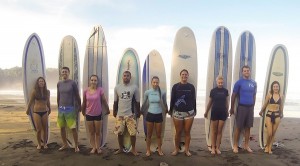
These days guest reviews are a huge part of travel planning, and any good surf camp/ school should know this. Look for and read their guest reviews on Trip Advisor or elsewhere to get a feel for other peoples’ experiences.
5. Do they provide equipment? Is their equipment in good condition?
All surf camp/ school equipment takes a beating and doesn’t stay new for long, especially if it is used daily by beginners in good surf….but old heavy broken boards and worn out leashes can be a safety hazard. A reputable school will take pride in their equipment and understand that it is important to properly maintain it. Also ask if you need to bring anything. In cold water destinations you will need a wetsuit, and you might want to take your own to ensure a good personal fit. In the tropics you can usually get away with just a swimsuit and a rash guard to protect you from the sun and are less likely to need to bring much gear, unless you are an experienced surfer in which case you will probably bring your own surfboard. Most surf camps keep boards for beginners and intermediates as their loaner quiver, because the experienced/ advanced surfers usually bring their own board(s). Remember that the more remote the location the harder it is to get equipment (and usually more expensive) so take good care of any equipment you use so it is in good shape for the next guy.
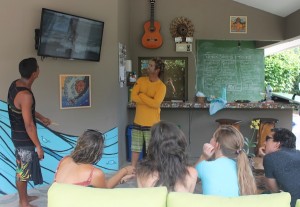
It is becoming more of a common feature now for camps to have a staff member shoot photos or video during the surf sessions, but sometimes they do it as an added service or fee rather than as a teaching aid. It is really beneficial to learning to have an instructor point out what you are doing (both right and wrong!) back at the surf lounge on the big screen. For example, many beginners are so focused of just getting up that they don’t realize that their posture needs work (they are hunching over at the waist like a caveman) until they see themselves on the big screen. Video and photo reviews aren’t essential but they certainly help.
7. How far is it from the school/ camp to the breaks? Do they provide transportation to the surf breaks?
It is always good to know how far away a camp is from the beach. You want to be able to be walking distance so that you can enjoy the beach on your own time as well. Usually if the school is not right on the beach they will offer transportation to and from the beach or different breaks for the surf sessions. You would think that this is a given, but some small operations will ask their guests to carry the boards to the beach (and beginner boards can be heavy and big!). Even if a school is located right on the beach it is important that they have transportation in case of an emergency.
8. How consistent is the surf?
Surf conditions, as we all know, are up to mother nature. There is no real surefire way to predict what the waves are going to be like when you are planning a surf trip. There are places that are much more consistent than others though, which increases your odds. Find out what the local break is and if there are a variety of local breaks nearby. The location for School of the World for example, was picked based on the fact that the area received waves almost every day of the year and there were a variety of breaks within a short drive that were ideal for a variety of different conditions, tides, swell sizes, swell directions, skill levels, etc. Find out as much as you can about the surf in that part of the world and particularly at the breaks near the camp to decide if it is right for you.
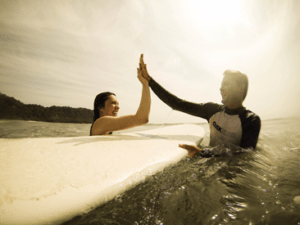
The ideal surf conditions for a spot may play a part in determining the window of time for a surf lesson or surf session, such as a spot breaking best around high tide. Your stamina also plays a part, but generally speaking most surf schools and surf camps take guests out for an hour and a half to two hour sessions at a time. More intensive programs may do two sessions a day (either back to back or at different times during the day). These sessions should ideally include a warm-up stretch and explanation of the ocean conditions or some local knowledge of the break. For newbies it is important to have a lot of one-on-one instruction, and schools will often use a rotation of turns in the water (so that guests can rest between waves/ turns). Beginners should have a 1:3 or less instructor to student ratio, while intermediate to advanced surfers will do fine with up to a 1:5 ratio, as they need a little less full time guidance. Five guest surfers per instructor should be the maximum, and 1:3 is the ideal. If you are an intermediate or advanced surfer it is important that you discuss your expectations and what you want to work on with your instructors before you surf so that you get the most out of their experience (and they know how much hands-on attention you want).
10. Do they offer lodging? If so, what are the options?
There is a huge variety in lodging options with surf camps, which is the biggest factor in the overall price. Some connect you with a variety of local hotels, but most offer their own lodging- these can range from simple hostel style accommodations all the way up to exclusive resort villas. Find what fits your budget and your expectations, and look for photos and current reviews from other guests.
Zach McDuffie
Founder, Creative Director at School of the WorldCheck out all the fun we’re having, right now, at the School of the World!
to reach our office directly +506.2643.2462
to reach a guest +506.2643.1064
U.S. number that connects to our office
+1-305-517-7689
schooloftheworld (skype)
Check out all the fun we’re having, right now, at the School of the World!
to reach our office directly
+506.2643.2462
to reach a guest +506.2643.1064
U.S. number that connects to our office +1-305-517-7689
schooloftheworld (skype)

